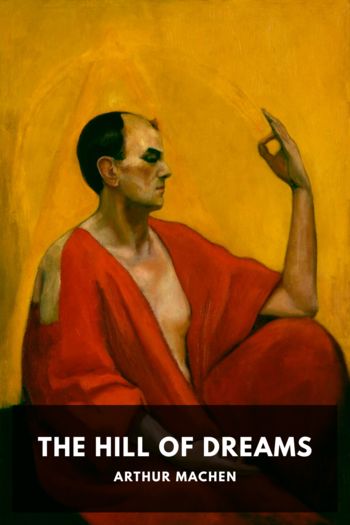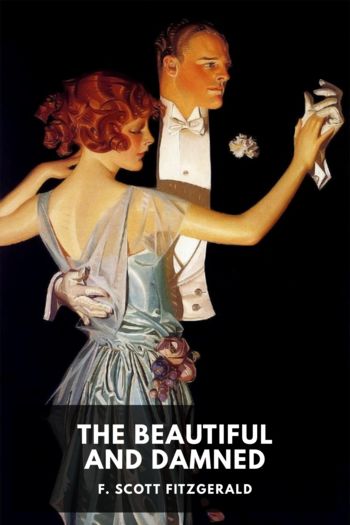The Hill of Dreams by Arthur Machen (best books for students to read .txt) 📕

- Author: Arthur Machen
Book online «The Hill of Dreams by Arthur Machen (best books for students to read .txt) 📕». Author Arthur Machen
But he felt that he had escaped. He could now survey those splendid and lovely visions from without, as if he read of opium dreams, and he no longer dreaded a weird suggestion that had once beset him, that his very soul was being moulded into the hills, and passing into the black mirror of still waterpools. He had taken refuge in the streets, in the harbor of a modern suburb, from the vague, dreaded magic that had charmed his life. Whenever he felt inclined to listen to the old wood-whisper or to the singing of the fauns he bent more earnestly to his work, turning a deaf ear to the incantations.
In the curious labour of the bureau he found refreshment that was continually renewed. He experienced again, and with a far more violent impulse, the enthusiasm that had attended the writing of his book a year or two before, and so, perhaps, passed from one drug to another. It was, indeed, with something of rapture that he imagined the great procession of years all to be devoted to the intimate analysis of words, to the construction of the sentence, as if it were a piece of jewelry or mosaic.
Sometimes, in the pauses of the work, he would pace up and down his cell, looking out of the window now and again and gazing for an instant into the melancholy street. As the year advanced the days grew more and more misty, and he found himself the inhabitant of a little island wreathed about with the waves of a white and solemn sea. In the afternoon the fog would grow denser, shutting out not only sight but sound; the shriek of the garden gates, the jangling of the tram-bell echoed as if from a far way. Then there were days of heavy incessant rain; he could see a grey drifting sky and the drops plashing in the street, and the houses all dripping and saddened with wet.
He cured himself of one great aversion. He was no longer nauseated at the sight of a story begun and left unfinished. Formerly, even when an idea rose in his mind bright and wonderful, he had always approached the paper with a feeling of sickness and dislike, remembering all the hopeless beginnings he had made. But now he understood that to begin a romance was almost a separate and special art, a thing apart from the story, to be practiced with sedulous care. Whenever an opening scene occurred to him he noted it roughly in a book, and he devoted many long winter evenings to the elaboration of these beginnings. Sometimes the first impression would yield only a paragraph or a sentence, and once or twice but a splendid and sonorous word, which seemed to Lucian all dim and rich with unsurmised adventure. But often he was able to write three or four vivid pages, studying above all things the hint and significance of the words and actions, striving to work into the lines the atmosphere of expectation and promise, and the murmur of wonderful events to come.
In this one department of his task the labour seemed almost endless. He would finish a few pages and then rewrite them, using the same incident and nearly the same words, but altering that indefinite something which is scarcely so much style as manner, or atmosphere. He was astonished at the enormous change that was thus effected, and often, though he himself had done the work, he could scarcely describe in words how it was done. But it was clear that in this art of manner, or suggestion, lay all the chief secrets of literature, that by it all the great miracles were performed. Clearly it was not style, for style in itself was untranslatable, but it was that high theurgic magic that made the English Don Quixote, roughly traduced by some Jervas, perhaps the best of all English books. And it was the same element that made the journey of Roderick Random to London, so ostensibly a narrative of coarse jokes and common experiences and burlesque manners, told in no very choice diction, essentially a wonderful vision of the eighteenth century, carrying to one’s very nostrils the aroma of the Great North Road, iron-bound under black frost, darkened beneath shuddering woods, haunted by highwaymen, with an adventure waiting beyond every turn, and great old echoing inns in the midst of lonely winter lands.
It was this magic that Lucian sought for his opening chapters; he tried to find that quality that gives to words something beyond their sound and beyond their meaning, that in the first lines of a book should whisper things unintelligible but all significant. Often he worked for many hours without success, and the grim wet dawn once found him still searching for hieroglyphic sentences, for words mystical, symbolic. On the shelves, in the upper part of his bureau, he had placed the books which, however various as to matter, seemed to have a part in this curious quality of suggestion, and in that sphere which might almost be called supernatural. To these books he often had recourse, when further effort appeared altogether hopeless, and certain pages in Coleridge and Edgar Allan Poe had the power of holding him in a trance of delight, subject to emotions and impressions which he knew to transcend altogether the realm of the formal understanding. Such lines as:
Bottomless vales and boundless floods,
And chasms, and caves, and Titan woods,
With forms that no man can discover
For the dews that drip all over;
had for Lucian more than the potency of a drug, lulling him into a splendid waking-sleep, every word being a supreme incantation. And it was not only





Comments (0)